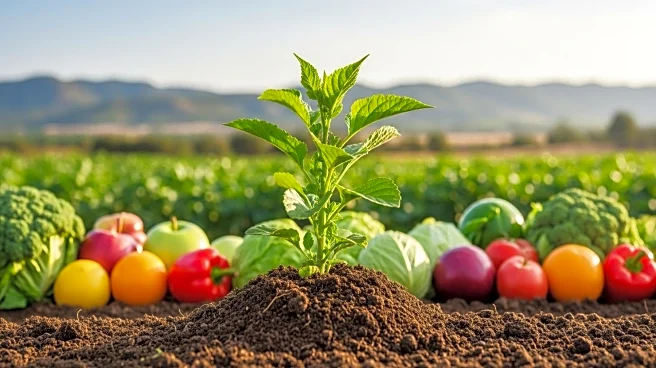What's Happening?
The market for regenerative agriculture certification, verification, and digital solutions is projected to grow at a compound annual growth rate (CAGR) of 19.7% from 2025 to 2034. This growth is driven by the increasing adoption of structured frameworks and technology-driven tools that validate and promote sustainable farming practices. These certifications aim to enhance soil health, biodiversity, and water quality, contributing to climate change mitigation. Innovations such as blockchain and IoT-based monitoring systems are being utilized to ensure transparency and accountability in farming practices. The market is segmented by solution type, end-buyer, application, and business model, with North America leading due to favorable regulations and high consumer demand for sustainable products.
Why It's Important?
The growth of regenerative agriculture certification and digital solutions is significant for several reasons. It supports the transition to climate-positive farming models, which are crucial for addressing environmental challenges. By providing transparency and accountability, these certifications help prevent greenwashing and ensure that sustainable practices are genuinely implemented. The market's expansion reflects rising consumer demand for ethically produced food and brand commitments to carbon neutrality. Additionally, government policies offering incentives for climate-smart agriculture further drive this growth. Farmers and producers benefit from premium pricing and access to new markets, while the broader society gains from improved environmental outcomes.
What's Next?
As the market continues to expand, further innovations in verification technologies and digital platforms are expected. Stakeholders such as farmers, agribusinesses, and regulatory bodies will likely increase their engagement with these systems to enhance transparency and efficiency. The demand for trustworthy standards and verification methods will grow, fostering innovation and integration of regenerative practices into global supply chains. Additionally, developments like blockchain-based carbon tracking systems will enhance the credibility of certifications, supporting the market's leadership in North America.
Beyond the Headlines
The shift towards regenerative agriculture certification and digital solutions has deeper implications for the agricultural sector. It represents a move towards holistic farming methods that emphasize ecosystem interconnections and ecological balance. This transition may lead to long-term shifts in agricultural practices, promoting sustainability and resilience. Ethical considerations around transparency and accountability in farming practices are also highlighted, as certifications aim to reward genuine efforts and prevent misleading claims.











